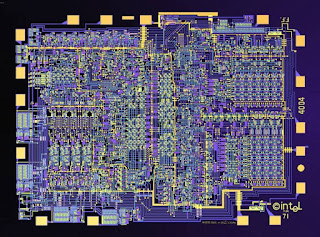On Primary Computation
Primary computation is not a particular kind of being. Nor can it be identified with being in itself. Primary computation is potentiality and considered in itself it is pure potentiality. Here I am thinking of primary computation in a similar way that Aristotle explains that "by matter I mean that which, not being a 'this' actually, is potentially a 'this' (Aristotle, Aristotle Book VIII). For primary computation alone has only potential existence and that without form there would be nothing but mere primary computation. Primary computation is not a 'this', it is only ever potentially a 'this'. Primary computation is, therefore not a thing – a substance without form cannot be said to exist. As Aristotle argues,
Since the substance which exists as underlying and as matter is generally recognized, and this that which exists potentially, it remains for us to say what is the substance, in the sense of actuality, of sensible things (Aristotle, Book VIII, Part 2).
Aristotle is arguing that a substance without form cannot exist as without form there would be nothing but mere primary matter. Similarly, pure computation without form does not exist by itself, since it is not an actual being – only potential. We can turn to Aquinas, who argues in relation to primary matter, but which I think also applies to primary computation, "primary matter does not exist by itself in nature, since it is not actual being, but only potential. Hence it is something con-created rather than created Nevertheless, primary matter even as a potentiality is not absolutely infinite, but relatively, because its potentiality extends only to natural forms" (Aquinas 1997: 439)
As pure potentiality, primary computation is completely formless – it is pure indetermination. But potentiality is always for something, so the question is, what is pure potentiality potential for? What is pure potentiality relative to? In this case, pure potentiality is relative to form and in the case of primary computation it is not merely potential relative to form – it is nothing but potentiality, in itself lacking any actuality. So whatever being or actuality primary computation has is conferred upon it by form and hence primary computation is nothing but the possibility of receiving form. Pure potentiality can then be said to be the 'essence' of primary computation. On the other hand, as a composite material thing, the essence must include a formal element.
So we might conclude that pure potentiality or primary computation is equivalent to nothing. But this is not correct. Rather primary computation has no reality apart from form. Which is saying that primary computation does not exist alone. If it could exist alone, then it would have to be determinate in some sense or another. But only form can provide this determination. Therefore, it would be a mistake to hold that primary computation has any existence apart from form. Primary computation is, then, equivalent to nothing only if it is considered as being apart from form. Since that is impossible, it is also impossible for primary computation to be equivalent to nothing. But it does not follow that because primary computation has no character of its own apart from form that therefore it has none distinct from form. Primary computation is different from a composite substance in being one of its constituent elements. It is different from nothingness because, although not a being in itself, it is a principle of being.
So we can see that a key characteristic of primary computation is its capacity to receive forms. This would be impossible if primary computation were nothing at all. In its capacity to receive forms it is purely passive – because of such absolute passiveness, indetermination, and formlessness, primary computation can be said to be infinite. What makes anything in nature finite is its form, for form limits and determines. Primary computation, in itself, being absolutely indeterminate is not thus limited and finite, and hence is infinite. However, to be clear, infinity attributed to primary computation, is not the same as, say, infinity attributed to God. God is infinite as to pure form and as pure act, and is not relative in any manner that is determined by the potentiality caused by matter. Primary computation is infinite in the sense of absolute formlessness and absolute indetermination. This infinity of primary computation is the infinity of imperfection rather than perfection. We might say that perfection is proportional to actuality and that imperfection is proportional to the lack of actuality, the lack of form and determinateness. Pure potentiality would be pure imperfection, and vice versa.
Primary computation is, therefore, the necessary condition for the existence of individual computational things. Without primary computation there could be no change of motion in computational things. And when computational form is thought of in complete abstraction from primary computation, such form is irrelevant to space and time. Primary computation, although not identical with, is certainly the foundation for the specialisation and temporalization of computational forms.



Comments
Post a Comment